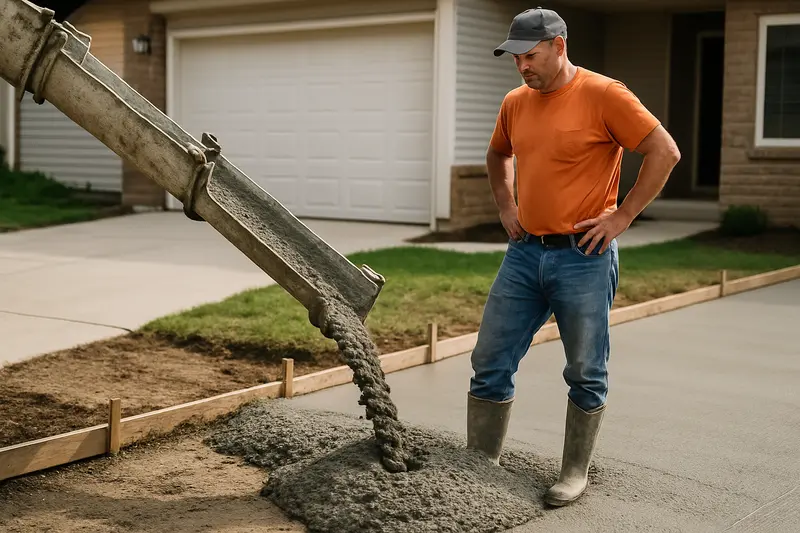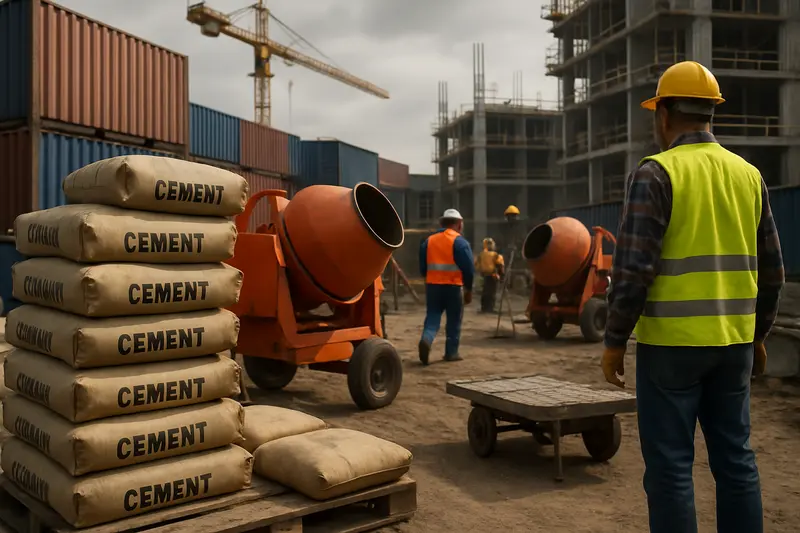
Concrete Industry Under Siege: Adapting to Tariff-Driven Material Cost Fluctuations
Tariffs and trade disputes are causing significant disruptions in the concrete industry, leading to soaring material prices and supply chain uncertainties. Firms are increasingly forced to adapt their strategies to maintain profitability and project timelines amidst volatility. For concrete construction companies, including those specializing as Concrete Driveway Contractors, proactive measures are essential to withstand these economic shifts. This article explores the impact of tariffs on the concrete sector and strategies companies are implementing to remain resilient in a turbulent market.
The Impact of Tariffs on Concrete Materials and Prices

At the bustling construction site, piles of raw concrete materials stretch across the yard, reflecting the recent supply chain disruptions. Workers, clad in high-visibility vests, hard hats, and steel-toed boots, maneuver cautiously among the heavy industrial equipment and towering shipping containers. Just beyond the activity, a seasoned contractor leans against a forklift, speaking intently with a project manager. Their conversation revolves around rising costs that have begun to grip the project’s budget tightly.
The recent imposition of tariffs on imported construction materials, especially those crucial to concrete production, has substantially increased material costs. Materials such as specialized aggregates and chemical admixtures, often sourced internationally, face added duties that inflate their prices. As tariffs fluctuate, so do these costs, creating a rollercoaster effect that challenges budget planning. For the contractor, this means constantly adjusting procurement strategies as prices soar and supply chains face new uncertainties.
The scene shows stacks of cement bags and rebar awaiting delivery—each item representing a ripple in the larger economic tide. Suppliers have tightened their availability, uncertain whether tariffs will ease or escalate further. Shortages cause delays, forcing contractors to make urgent decisions—sometimes accepting higher prices or seeking alternative, less preferred materials. This push-and-pull dynamic underscores a critical challenge for concrete companies: maintaining project timelines amid unpredictable costs.
Amidst the chaos, some workers discuss the tactical responses to these pressures. Paying premiums on materials is becoming commonplace, though not without concern. The contractor’s discussion with the project manager highlights a focus on cost management strategies—locking in prices where possible, exploring domestic substitutes, and re-evaluating project scopes to absorb financial shocks. Recognizing that supply chain disruptions are inevitable, companies are also considering longer-term solutions, such as diversifying suppliers or investing in local aggregate sources, to buffer against future tariff impacts.
The backdrop of shipping containers and industrial machinery emphasizes the global interconnectedness that underpins local construction. When tariffs spike, the entire supply chain stumbles, delaying deliveries, increasing local prices, and forcing project managers into a constant state of adaptation. For concrete construction companies, understanding these impacts and designing flexible procurement processes are vital for staying afloat amid rising costs.
Further compounding the challenge are the volatile market conditions that have surfaced partly due to changing government policies. As tariffs continue to influence material prices, firms must stay informed and agile, continuously recalibrating their budgets and supply strategies. This ongoing dance with tariffs underscores the importance of strategic foresight. Exploring reliable sources and understanding the broader economic policies can help companies mitigate risks more effectively. For instance, consulting industry insights from local resources like concrete contractor cost guides can provide valuable benchmarks amidst the chaos.
Ultimately, this scene captures a moment of resilience and adaptation. Concrete industry professionals are learning to navigate a landscape where tariffs and global trade policies heavily influence what they pay and what they can source. Success now hinges on proactive planning, diversification, and flexible contracting—skills that will define the industry’s resilience in a time of economic uncertainty.
Innovative Strategies for Managing Cost Volatility

Confronted with persistent fluctuations in material costs driven by tariffs, concrete construction companies are increasingly turning to innovative strategies that emphasize proactive management and diversification. In a dynamic marketplace where prices can swing unexpectedly, a collaborative approach among contractors, supply chain managers, and logistics specialists becomes essential. During strategic meetings—often held in modern conference rooms equipped with digital tools—teams analyze comprehensive data sets to identify patterns in pricing and supply disruptions. By leveraging real-time market intelligence, they can anticipate potential cost spikes and adjust procurement plans accordingly.
One key tactic involves diversifying supply sources to reduce dependency on a single supplier or geographic region heavily impacted by tariffs. Companies are establishing relationships with multiple suppliers across different regions, ensuring flexibility and reducing risk exposure when tariffs threaten to inflate costs. This approach allows them to switch suppliers swiftly should tariffs or logistical issues disrupt their primary sources.
Furthermore, proactive inventory management plays a vital role in mitigating volatility. Maintaining strategic stockpiles of essential materials gives companies a buffer against sudden price hikes or delays. Some contractors are adopting just-in-time practices combined with safety stock to optimize cash flow while remaining resilient to supply chain shocks.
Another emerging strategy emphasizes integrating advanced technologies such as analytics and forecasting tools. These tools help project future pricing trends based on current data, enabling firms to lock in prices through forward contracts or bulk purchasing agreements before costs escalate further. Additionally, tracking material samples and analyzing market charts within the team fosters a culture of informed decision-making.
Cost management also involves contractual flexibility. Incorporating clauses that accommodate price adjustments or escalation provisions helps shield companies from unexpected financial burdens. Engaging suppliers in transparent negotiations about tariffs and potential impact ensures mutual understanding and fosters long-term partnerships.
Beyond strategic procurement, companies are exploring value engineering and alternative materials to reduce reliance on costly traditional components. For instance, using innovative admixtures or recycled aggregates can maintain quality standards while lowering costs. These measures highlight the importance of continuous innovation in material selection and construction methods.
Ultimately, staying ahead of volatility requires ongoing education and internal communication. Regular training sessions and cross-disciplinary meetings ensure that teams remain aligned and agile. For more insights into cost-effective concrete solutions tailored to Houston’s unique climate and market conditions, visit this comprehensive guide. By combining proactive planning, diversification, and technological integration, concrete companies can turn the challenge of fluctuating costs into an opportunity for resilience and growth.
Final words
Facing the pressures of tariffs and volatile material prices, concrete construction companies must remain flexible, innovative, and proactive. Embracing strategic sourcing, diversifying supply channels, and refining project management approaches are vital for sustained success. For Concrete Driveway Contractors, adapting to these economic shifts is critical not only for maintaining margins but also for delivering quality work despite the challenging climate. Staying ahead requires a commitment to resilience and strategic planning in a landscape reshaped by international trade policies.
Find the Best Concrete Contractors in Houston. Partner with top-rated professionals to ensure quality projects and reliable service despite market fluctuations.
Learn more: https://concretecontractorshouston.com/contact/
About us
Join the Featured Listings on Concrete Contractors Houston and put your business in front of homeowners, builders, and businesses actively searching for concrete experts like you. As a Featured Contractor, your listing appears at the top of our directory—guaranteeing maximum visibility and making you the first choice in your service area.
